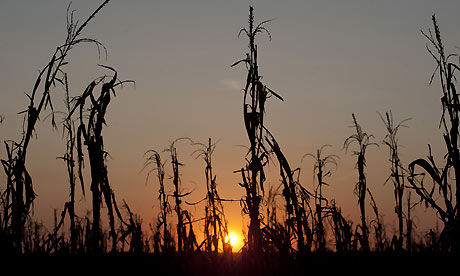The mass slaughter of millions of farm animals across the world is expected to push food prices to their highest ever levels.
As well as hitting consumers' pockets, the predicted 14% jump in food prices will also dash the Bank of England's hopes of pushing inflation down to 2% by next year.
Farmers across the world have begun a mass slaughter of their pig and cattle herds because they cannot afford the cost of feed, which has soared following the worst US drought in living memory, according to a report published on Wednesday.
Experts at investment bank Rabobank warn that the mass "herd liquidation" will contribute to a 14% jump in the price of the average basket of food by next summer.
On Tuesday, the Office of National Statistics (ONS) said lower food prices had helped bring inflation down to 2.5% in August.
That brings it closer to the Bank's 2% target and should help consumers who have seen their spending power shrink as wages fail to match inflation. The Bank expects inflation to ease below the 2% target by early next year, but that could be scuppered by rising food, oil and commodity prices.
Rabobank said the slaughter of millions of pigs has already led to a 31% increase in the price of pork and the costs of other meats are also expected to soar as "US livestock herds are likely to be liquidated at an accelerating pace in the first half of 2013".
Nicholas Higgins, a Rabobank commodities analyst and author of the report, said: "There will be an initial glut in meat availability as people slaughter their animals to reduce their feed bills. But by next year herds will be so reduced that there won't be enough animals to meet expected demand and prices will soar."
While all meat lovers will be affected by the record-breaking price rises, Higgins said bacon butty fans may suffer the biggest increases because it is easier for farmers to slash and rebuild pig herds that cattle.
"Farmers cut back pigs because they can rebuild them the quickest. Replacement cattle take a lot longer to breed – a year and a half compared to six months for pigs," he said.
The report said the mass slaughter of pigs had led to a steep decline in the price of pork for delivery next month, but a 31% increase for pork delivered in July 2013.
Because meat and dairy products already account for 52% of the cost of the average global basket of food Rabobank predicts the overall price of the basket will soar to a record 243 on the United Nations Food and Agriculture Organisation (FAO) index next summer.
If Higgins' prediction is correct it will be the highest the index has ever reached and 175% higher than it was in 2000.
Higgins said he did not expect a repeat of the 2007-8 food riots in developing countries across the world because most meat is consumed in the west.
"People are less likely to be irate over meat prices when they can switch back to staples – an option not available in 07/08 due to severe shortages of wheat and rice," he said. "The risk [of riots and social unrest] is still there but it is not as high as 07-08. The prices will hurt here [in the west] more."
But he said western consumers are unlikely to significantly change their diets or become vegetarian in response to price rises.
Higgins said the major danger to global stability was the threat of countries stockpiling supplies. "We've already seen the first indications of that, with Indonesia hinting it is going to increase corn stock pile levels, South Korea considering a domestic purchasing regime and very strong wheat purchases in Iran disproportionately higher than in its past history."
While the food price spike is likely to lead to an increase in starvation and malnutrition across the world, global food traders are expecting bumper profits. The multimillionaire head of Glencore has said the US drought will be "good" for the commodities trader because it will lead to opportunities to exploit soaring prices.

